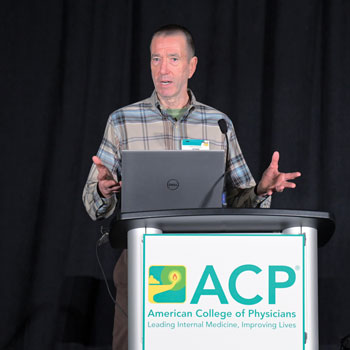For early career IMGs, community is key
Speakers at Internal Medicine Meeting 2025 explained how international medical graduates (IMGs) can create a sense of community and establish mentors to acclimate to new jobs.
All early career physicians face challenges as they acclimate to new jobs, but many international medical graduates (IMGs) are also still adjusting to an entirely new country. In the session “Thriving During Early Career as an IMG” at Internal Medicine Meeting 2025, three experts offered advice on managing this transition.
Panelist and ACP Member Petal Elder-Odame, MD, MPH, kicked off the discussion by listing common problems IMGs face. “You may miss your home, your culture,” she said. “Some people may deal with impostor syndrome, feeling like you just don't fit in, like something's missing.” IMGs may also confront discrimination or microaggressions from patients and colleagues and can struggle when learning the U.S. medical system. “It's a huge transition if you're coming from a country that doesn't use an electronic medical record, for example,” she said.
The first step in overcoming these challenges is to create a community, said Dr. Elder-Odame, who is an attending hospitalist at Beth Israel Deaconess Medical Center and an instructor at Harvard Medical School in Boston. “It defeats those feelings of isolation. Once you create a community, you connect,” she said.
She also noted that it's important to find other outlets and hobbies. “Many of us have many different passions outside of medicine that keep us going, spark a sense of inspiration, a sense of curiosity, something that just allows us to de-stress,” she said. “So don't neglect those other passions.”
Mentors are particularly vital to IMGs, and Dr. Elder-Odame advised attendees to get over any fears about finding them. “We can't do it alone. Knock on those doors, send those emails, ask the questions you need to ask. You have nothing to lose,” she said. “People have been through it, and they want to help. They want to contribute.”
Moderator Ricardo Correa, MD, EdD, FACP, also stressed that it's possible, and maybe even preferable, to have more than one type of mentor. “My model of mentor was this research mentor that was with me and helping me every day. It's not like that,” he said. “Sometimes your mentor is a person that probably you see once a year … and sometimes that person, when something comes [up], thinks about you and then gives you the next opportunity in your career.”
To that end, don't be afraid to stand out from your peers, advised panelist Alejandro Moreno, MBBS, MPH, JD, MACP. “You have to be noticed and be bold for the right things, and that includes saying yes, especially early in the career,” he said. “You will learn how to say no later on, but build the reputation around something.”
Like all internal medicine physicians, IMGs have to choose among various potential pathways after training, Dr. Correa said, including academic medicine, industry, private practice, and hospital practice.
Considerations include how academic medicine and nonacademic medicine are similar in that they both rely on clinical revenue to fund activities, quality improvement is based on scholarship and research, and salaries increase with experience, he explained. The choice of pathway may determine whether you spend your time on education, clinical work, or hospital leadership, at least at the start.
“The important thing is that it depends on what you want,” said Dr. Correa, who is a clinical professor of medicine at Cleveland Clinic in Ohio. “There's no limit for IMGs…. [you can] start in nonacademic and move to academic, or start in academic and then move to nonacademic, or different things in the middle.”
One thing that can affect certain opportunities is an IMG physician's need for a visa, Dr. Correa acknowledged. He noted that the current political climate in the U.S. can be particularly challenging for IMGs, given potential changes to J1 visas and Department of Health and Human Services waivers, for example.
“There is a lot of things happening right now … but we have to understand something,” he said. “We represent 25% of the practicing physicians in the country and in internal medicine, approximately 45% to 55% of it. So we are a big group, and we need to come together always and make a lot of pressure.”
Coming together can be made easier by joining professional organizations like ACP, all three experts said. “It connects you to like-minded people, also people who've gone through similar things that you may be going through, and you can get the mentorship and guidance throughout your career,” Dr. Elder-Odame said.
Dr. Correa used himself as an example, describing how he joined the Florida Chapter of ACP as a resident, then became Chair of the chapter's resident and fellow section, a member of national ACP committees, and a member and Chair of the Council of Early Career Physicians.
“As Chair, you get to be part of the Board of Governors for a year, the Board of Regents for a year, and then meet all of these great people that are moving this organization and have an opportunity to shape also the organization,” he said. “That was a great, great opportunity for me.”
Dr. Moreno, who is a professor of medicine at the University of Texas at Austin Dell Medical School, noted that his involvement with professional organizations like ACP helped him acquire leadership and negotiation skills beyond what he'd learned in medical school. “And those skills are transferable, because when you go to your boss and say, ‘I want to start this project,’ you have to have your five-minute elevator speech to sell to your chair or to the dean.”
Dr. Correa said he tells his mentees that when they go to a national meeting, 50% of their time should be spent going to lectures and the other 50% should be spent meeting people. “That is what is going to help you a lot,” he said. “Now that we have the recording [of conference lectures] online, you can use them later, but nothing will replace meeting people [in person].”
The physician contacts an early career IMG makes through professional groups and elsewhere can provide support throughout their career by writing letters of recommendation, vouching for their skills, or helping them find an open position. Sometimes you don't even have to ask for this help, Dr. Moreno said. He told the audience how he'd recently mentioned to a colleague from South Carolina that he and his wife were considering moving to Greenville once their children had graduated from high school.
“He's getting his phone out and saying, ‘Let me make a phone call, because there is a position open in Greenville … for a senior medical educator.’ I told him, ‘No, no, no, not yet,’” Dr. Moreno said. “But it's that kind of networking that can open the doors for your future.”




